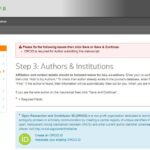This week, we read about some of the pitfalls surrounding current practices in research publication and conduct, as well as recommendations for how to overcome these issues. We also hear about how improved open access to federally funded research in the USA came to be and the compromises that were made to achieve this. In a similar vein, we also highlight the strategies being employed by the Finnish government to improve open access to scientific research. Finally, we learn about the MAPS EMEA 2022 meeting that took place in France earlier this week.
To read:
Revamping the accreditation system in scientific research via Eos | 10-minute read
The current methods for providing acknowledgements and accreditations in scientific research are not fit for purpose and need revamping, argue the authors of this article published in Eos. Misrepresentation and undervaluation of an author’s contribution to a piece of research can foster a hostile and exclusive environment in which success is measured using invalid metrics, such as authorship in high-impact journals and citations. This article describes a number of recommendations for a common accreditation system but also highlights that proper accreditation can be discipline dependent.
The incentive-driven nature of predatory journal publishing via Research Professional News | 3-minute read
In this article, Emanuel Kulczycki from Adam Mickiewicz University in Poznań, Poland, discusses how reshaping research evaluation into a one-size-fits-all approach can lead to increased predation of research by predatory journals. The author concludes that there is a need to reform the incentives that push researchers towards predatory journals.
Improving the current landscape of medical research in the UK via BMC Research Notes | 10-minute read
In this article published in BMC Research Notes, the authors contend that present practices in medical research and publication are unsuitable and lead to unwelcome consequences, such as reduced public trust in research, wasted funds, irreproducible data and, in some severe cases, scientific fraud. The article goes on to outline the underlying issues that lead to these consequences, as well as a number of recommendations that could be implemented to address them.
The path to open access for federally funded research via The Scholarly Kitchen | 8-minute read
In the first of two articles, Rick Anderson describes a number of interviews conducted with members of the Scholarly Publishing Roundtable, an initiative that significantly impacted White House federal policy and resulted in a considerable expansion in access to federally funded research. The interviews detail the cooperation and a number of compromises that had to be struck in order to gain consensus between different sectors, such as librarians, publishers and researchers. The first article also discusses a publication to mark the tenth anniversary of the roundtable, looking back at the experience and towards what can be learned for the future. The second part of the interview is available here.
Academy of Finland to expand diamond open access via The Academy of Finland | 2-minute read
The governmental funding body for scientific research in Finland, The Academy of Finland, this week signed a global action plan to further develop and expand diamond open access, which will support research that is free for both the scientific community and the public. This step reaffirms the academy’s commitment to open access research as outlined in Finland’s National Declaration for Open Science and Research 2020–2025.
To engage with:
MAPS EMEA 2022 Annual Meeting via Oxford PharmaGenesis
As conference season continues, medical affairs professionals from around Europe, the Middle East and Africa (EMEA) attended the Medical Affairs Professional Society (MAPS) EMEA 2022 annual meeting in Paris this week. The meeting included workshops presented by Oxford PharmaGenesis on best practice in medical affairs for an integrated medical communication strategy and plan.
Have you seen our recent commentary about user perspectives on plain language summaries? Read it here in Current Medical Research and Opinion.






